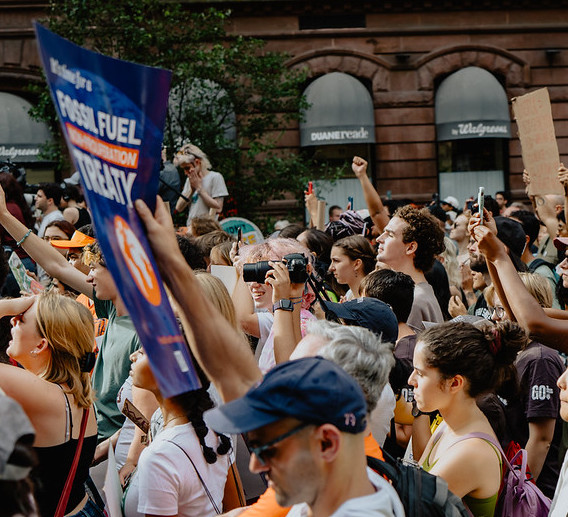© Hanae Takahashi, Friends of the Earth Japan / CC BY-NC-ND 2.0 DEED via Flickr.com
Fossil fuel treaty
Stopping the proliferation of fossil fuels—equitably
Fossil fuel production is on track to push the Arctic past well-known critical tipping points. Countries are planning for expansions that would lock in the climate crisis as well as health, environmental and security risks. As ALEX RAFALOWICZ explains, that’s why governments, civil society, and Indigenous, business and other leaders are now calling for a fossil fuel treaty that would phase out oil, gas and coal and accelerate the transition to clean energy both quickly and fairly.
At the United Nations Framework Convention on Climate Change Conference of the Parties (COP28) in December, representatives from nearly 200 governments agreed to start reducing global fossil fuel consumption. While the deal fell short of a complete phase-out, it was the first of its kind to signal a coming end to the age of oil. In addition to calling for a transition away from fossil fuels in order to achieve net zero by 2050, the deal also commits to a tripling of renewable energy capacity globally by 2030.
While there is still no mechanism within existing UN processes to manage an equitable energy transition, the urgency of the climate crisis will inevitably end the expansion of fossil fuels, wind down existing production, and ensure a fast and fair shift to clean energy. This is where the Fossil Fuel Non-Proliferation Treaty comes in.
The Fossil Fuel Non-Proliferation Treaty
The Fossil Fuel Non-Proliferation Treaty is a global initiative to foster international cooperation to end the expansion of fossil fuels, wind down existing production in keeping with science, and acceler- ate a fair transition to clean energy and other low carbon solutions.
Production plans are out of step with commitments
Countries are currently planning new fossil fuel production at levels that would result in 110 percent more emissions than what is in keeping with the Paris Agreement’s goal to limit warming to 1.5°C. There is enough renewable energy potential in every region of the world to deliver energy security to all, but markets and climate politics are being skewed by the influence of the fossil fuel industry and producer countries. The latter have dumped more than US$1 trillion into subsidies for fossil fuel companies to expand the source of the problem—oil, gas and coal—while avoiding the most critical steps, all of which involve moving away from fossils.
As with historic threats of nuclear weapons, ozone-depleting substances, landmines and, most recently, plastics, international cooperation is needed to ensure the phase-out of fossil fuels is done in a well-managed rather than chaotic way. Countries such as Colombia and Timor-Leste depend on oil production to feed debt payments and fund government services. Yet Columbia announced at COP28 that it has joined the phase-out global campaign and signed the Fossil Fuel Non-Proliferation Treaty. The wealthy producer countries that have the greatest capacity to make the shift must be first movers and set more ambitious targets for phasing out fossil fuels while also providing financial and technical resources to other countries so they can be part of the transition.

© Fossil Fuel Non-Proliferation Treaty
An agreement with equity at the centre
Inspired by past efforts to drive innovative solutions to pressing global problems, 11 countries—led by Pacific Island nations—along with 100 cities, nine Indigenous nations from the Amazon, the Parliament of the European Union, the World Health Organization, hundreds of other health groups, 700 national lawmakers, subnational governments (including California and Hawaii), 100 Nobel laureates, thousands of scientists, and numerous civil society organizations (including WWF) are now calling on countries to negotiate a Fossil Fuel Non-Proliferation Treaty with equity at the core.
Sadly, some Arctic nations themselves—Canada, the United States, Norway and Russia—are among the biggest proliferators. Yet history shows we can come together to solve global threats like this. It starts with a few principled countries and spreads from there.
There is no way to save the Arctic without stopping the proliferation of fossil fuels. WWF’s leadership and vision in joining the call for a Fossil Fuel Non-Proliferation Treaty is contributing to this turning point. Join us at www.fossilfueltreaty.org.
ALEX RAFALOWICZ is the executive director of the Fossil Fuel Non-Proliferation Treaty Initiative. A lawyer and climate campaigner, he has worked with the Global Campaign to Demand Climate Justice, the Climate Action Network, and 350.Org.